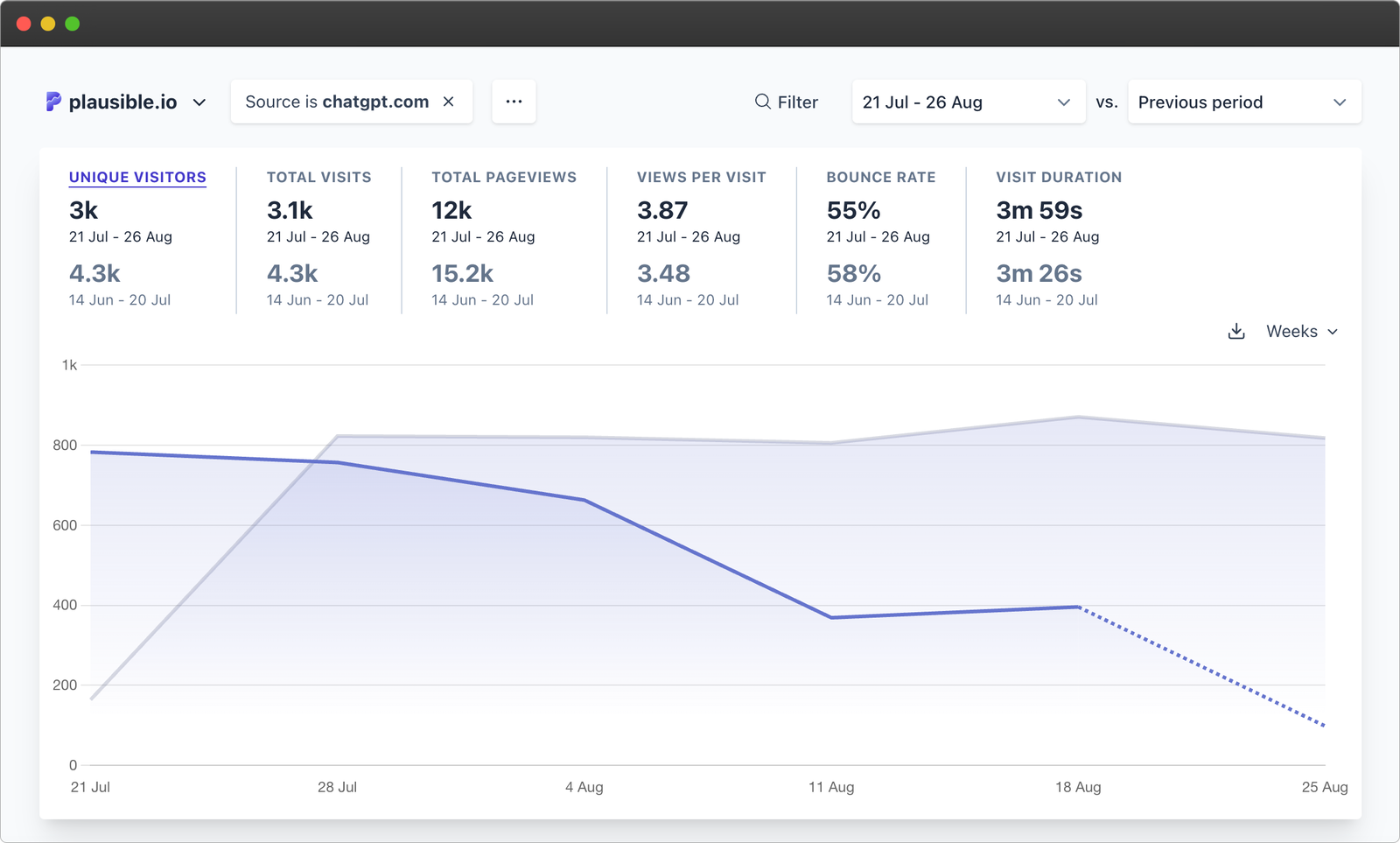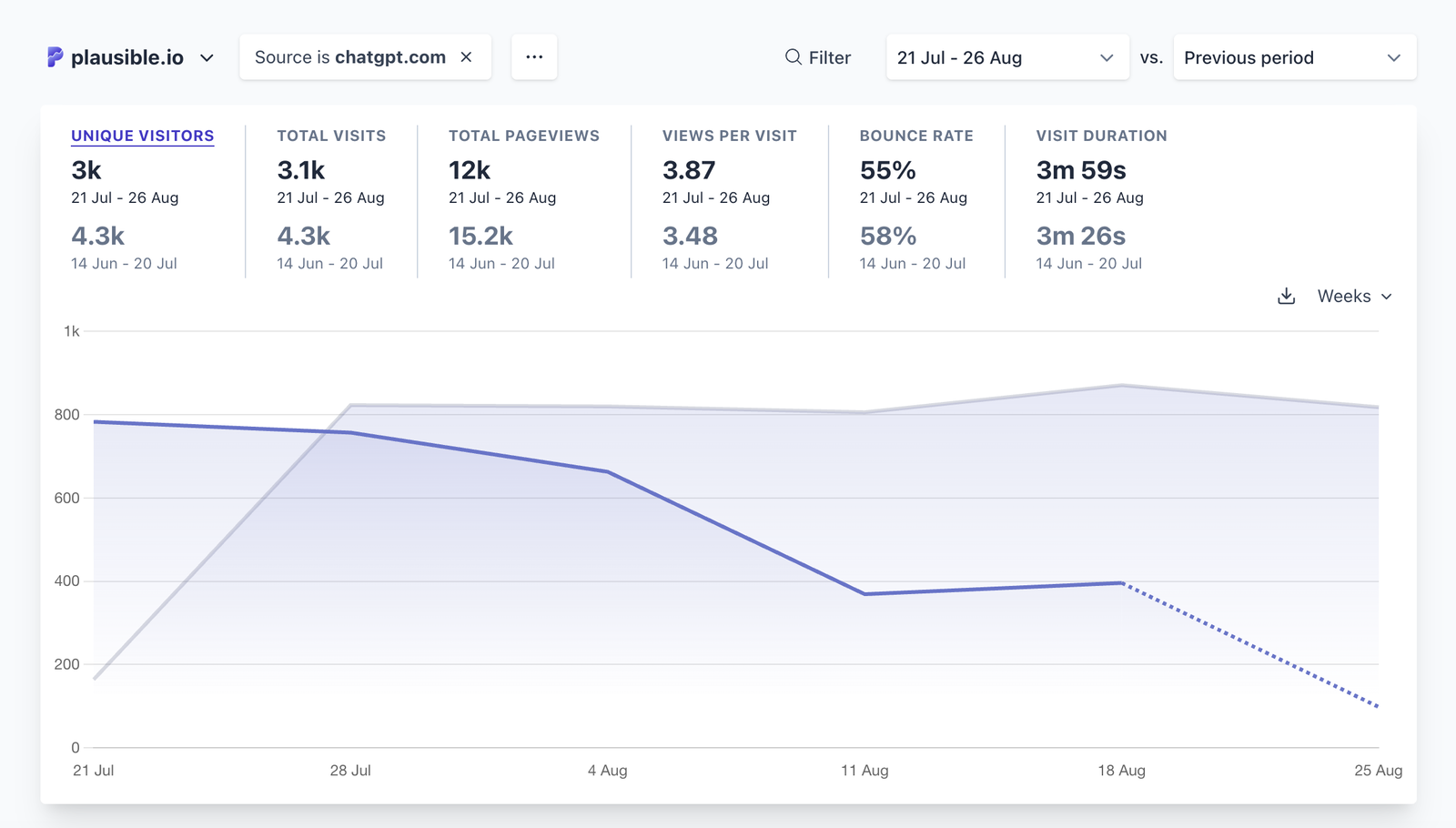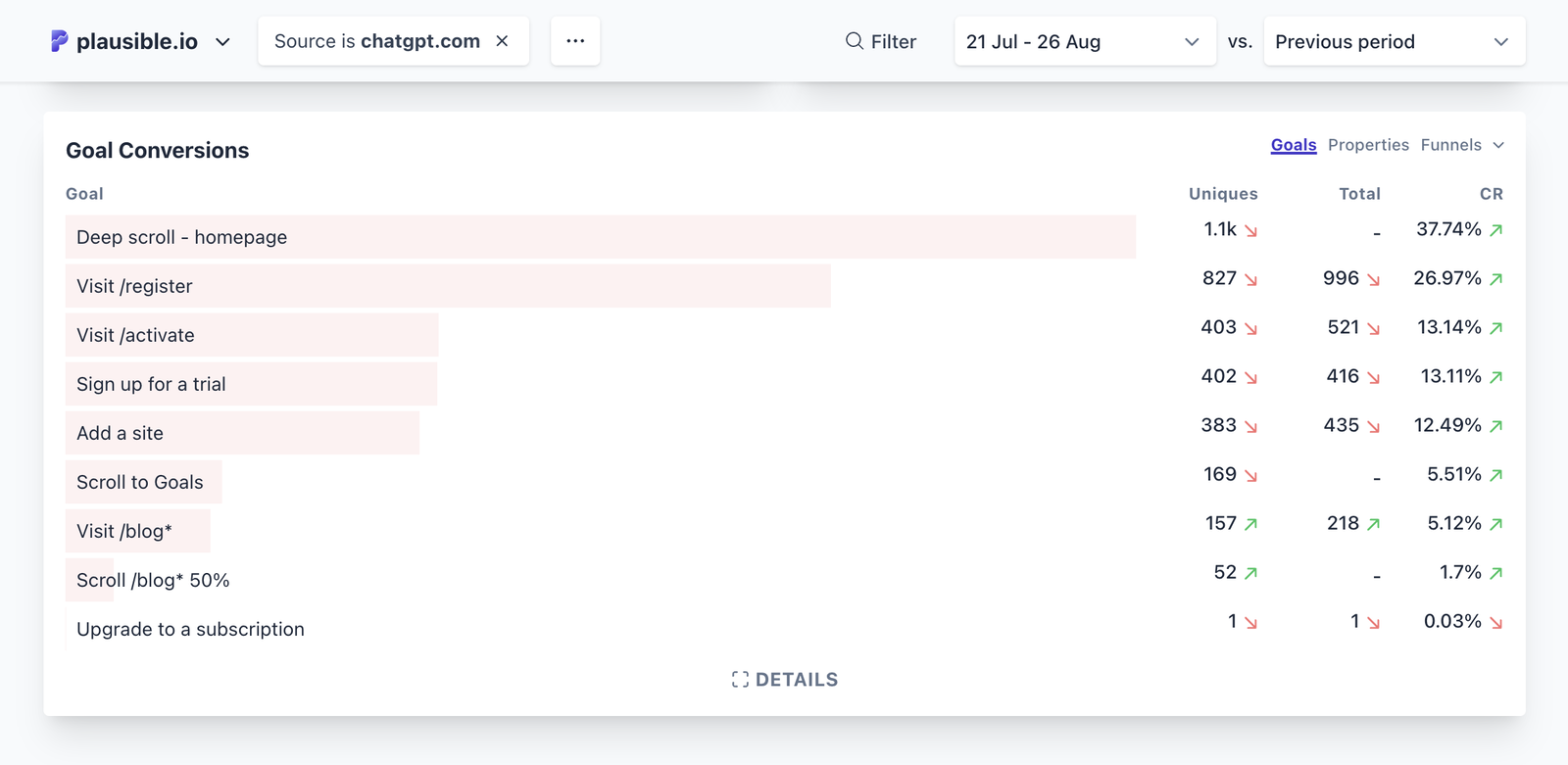ChatGPT traffic is down, but Engagement is up!

According to multiple users’ reports, the referral traffic from ChatGPT has been declining since July 21 and more so after 7 August (i.e. the launch of GPT-5).
According to this LinkedIn post, the decline of referral traffic is at 52%. They analyzed 1+ Billion ChatGPT citations and 1+ million referral visits from ChatGPT. They found that this is because of the citations by ChatGPT being shrunk down to only a few reliable, answer-first, people-first information sources.
The major sites being cited now are Wikipedia, Reddit and TechRadar. These are the ones providing neutral, and/or opinionated recommendations to products and sharing information. Apparently, 1 in 5 ChatGPT citations are now going to just these three sites.
Naturally, we checked if this had impacted Plausible, especially because our ChatGPT numbers had been growing really well. Having found out what we did, we have two cents to add to what is going on – as the traffic seems to be more qualified.
The fall of ChatGPT referral traffic
The decline in referral traffic from ChatGPT means fewer visits and fewer signups for most.
OpenAI may be tightening which links surface inside chats, potentially keeping more traffic within its own ecosystem. Others wonder if this is the classic “platform playbook”: reduce organic reach just before introducing ads or new monetization features — a pattern we’ve seen before with Facebook and other platforms.
For those who hoped ChatGPT might one day rival Google as a traffic source, the last few weeks have been a reality check.
Yet when we look at our own numbers, the picture isn’t entirely bleak. Engagement signals are up, even as traffic fell. Here’s what we’re seeing:
Below is the screenshot of our live Plausible dashboard for the period starting 21 July, compared to the previous period, filtered for ChatGPT-referred traffic.

Here are the observations:
- Visits down by 29% ↘ (negative signal)
- Views per visit up by 11% (positive signal)
- Bounce rate down by 3% (positive signal)
- Visit duration up by 16% (positive signal)
- Conversion rates up, even though slightly
Even though the traffic has definitely gone down for us by significant margins, the engagement rate has improved.

This trend suggests ChatGPT is leaning more on neutral, high-trust sources (like Wikipedia, Reddit, and neutral sites). For site owners, it means one thing: low-quality or filler content won’t make the cut.
People-first, original, and trustworthy content is still finding its way into GPT chats — and still sending valuable traffic.
What does this mean?
While we have only analyzed our own dashboard, the fact that our engagement rate still improved while the traffic declined means that ChatGPT is sending more quality traffic as compared to before.
This is all because of the improvement in the quality of answers provided by ChatGPT, making high-intent visitors come to the site, essentially weeding out the ones that weren’t probably the best fit for a site.
Another thing that supports this hypothesis is we’re organically mentioned on platforms like Reddit, Wikipedia, and similar, since the beginning of Plausible.
What you should do next?
Some straightforward solutions will suggest you to do “Reddit growth hacking” or get more Wikipedia mentions or get more and more backlinks from the web.
But we’ve never been the ones to do any sort of citations or growth hacking, neither do I believe that such tactics can survive the next AI update (as it will only get better and better at weeding out content written for making you click sign up and not for providing original value).
So here’s our two cents:
Shift from conversion-first to answer-first content
Think for a second, how ChatGPT conversations are. Regular people, natural language, real queries, real solutions. So if your content still sounds like corporate lingo or doesn’t answer real questions or resonates with real people, you stand a high risk of being left behind.
Another thing to do is manage expectations. AI chats are now being optimized to answer as much as possible within the chat itself, which is bound to affect referrals. Which brings me to the next point.
Build a brand and community
While the traffic from SEO, AI, ads – all continue to decline, the one reliable thing that can save your boat is your brand. Brand will give you identity, authority, credibility. That’s unbeatable and if it resonates with the right people, it’ll also be shared by folks on Reddit (and similar communities for instance), and hence cited by ChatGPT and eventually also improve other AI channels as well.
The same goes for your unique community and evangelists so you can minimize dependence on third-party referrals. It could mean more relatable and consistent social media content for you, newsletter subscriptions, or Discord/Slack/LinkedIn/WhatsApp communities, etc.
Refresh your content
One attribute of Reddit is that it offers fresh content because the conversations are always flowing, 24*7. It could be the latest software updates, the next big trend in fashion, or car reviews, almost anything you can possibly think of.
Keeping your content up-to-date would also be a good idea.
Write original content
Publish content only you can provide. It can be thought leadership, your unique opinions, original research studies relevant to your industry or useful to your customers. Anything that basically is something unique to your brand.
Such content cannot be duplicated and is instead cited across different content pieces, AI chats, and of course communities like Reddit.
Conclusion
Traffic from ChatGPT may never match Google’s scale, and these drops prove how volatile referral traffic from new platforms can be. The short-term feels negative — fewer clicks, fewer signups. But the silver lining is that quality is rising: those who do arrive are more engaged and more likely to convert.
For site owners, the lesson is clear: don’t bank on ChatGPT as the next Google, but do treat it as a growing channel where people-first content can win trust, attention, and conversions.